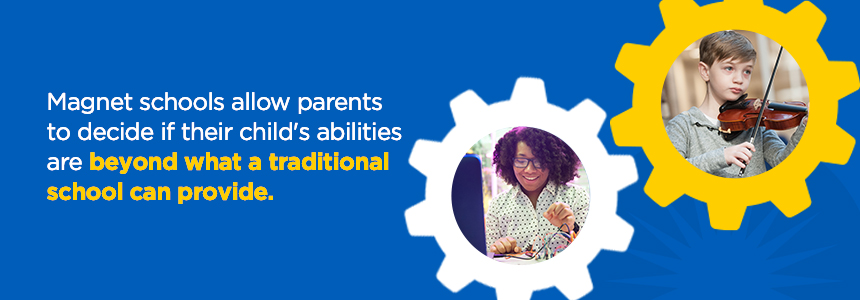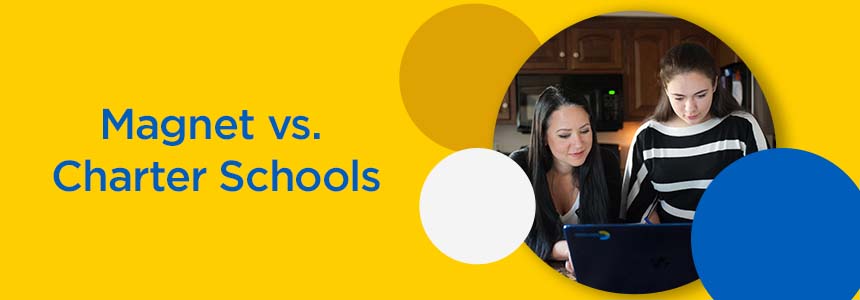Do you know the differences between a magnet school and a charter school? Both models of schools are relatively new when compared to traditional schooling. Charter and magnet schools are rated among the top-tier schools when looking at the best high school rankings in the U.S.
Magnet schools came first in the 1960s to introduce diversity within the school walls and help desegregate students naturally. Following magnet schools, charter schools entered the scene around 1990 and focused on being even more flexible and innovative than prior styles of schools.
What Are Magnet Schools?
Since their inception in the 1960s, magnet schools have always been a part of desegregating race in schools. Giving the option for students to have an education that focuses on specific areas of interest helped draw students from other schools to share their common educational goals no matter what race they were.
With the changes of society in the subsequent decades, magnet schools have re-focused their efforts. Currently, magnet schools focus on promoting academic excellence combined with opportunities for both students and families.
What Are Charter Schools?
Charter schools started in 1990 and are public schools that are a school of choice. They are focused on committing to specific educational objectives.
These schools are bound to a charter that functions as a contract. The charter encompasses the following:
- Mission
- Fiscal policies
- Academic goals
- Accountability requirements
An authorizer, such as the state or a school district, then approves this charter, and families can choose to enroll their children in the charter school’s program. Because of these aspects, charter schools have more flexibility in both the operations and management of the school than traditional public schools.

Differences Between Magnet and Charter Schools Explained
While there are a few similarities between charter and magnet schools, there are some key differences, too.
Magnet schools are established and run from within the school district or a group of school districts. They are free to attend and have a local school board. The funding comes from local government and local legislation to help with operating costs. Because of these facets, they also have to participate in state-mandated testing. With the additional funding comes more specialized learning and focus on specific categories.
Magnet schools can be focused on math and science or lean more heavily on performance arts. The academic focuses depend on what the school district feels needs increased study. They intend to draw students who excel in specific academic courses to a school that can foster their intelligence and passion into a higher level of learning. Magnet schools allow parents to decide if their child’s abilities are beyond what a traditional school can provide. They want to help the child increase their ability to push themselves and acquire more skillsets within those academic studies.
As of 2019, there are over 3,400 magnet schools in existence — quite a significant increase from 2001, when there were roughly 1,400 magnet schools open to the public. Here are some key attributes of magnet schools:
- No tuition to enroll
- Publicly funded
- Regulated by the state.
- Held to the standards and requirements of traditional public schools
- All teachers are state certified
- Students are chosen by lottery generally but also by interview, entrance exam, or audition
- Magnet schools can’t legally discriminate between students
Charter schools, much like magnet schools, are free to attend, but with some critical differences in how they are run and funded. There are more charter schools available than magnet schools, with over 7,000 as of 2019. Despite being part of the public school system, charter schools are operated by independent organizations. They do not rely on local district leadership or guidance.
The laws that govern charter schools differ from state to state. These schools can create and adopt their own curricula for various subjects, separate from the district’s predetermined programs. While the curriculum is flexible, charter schools must meet all specifications in the performance contract. The certification requirements for charter school teachers differ according to state, and the district hires experts in their field who fit the academic purposes of their chosen study.
Here are some other key attributes of charter schools:
- They do not require tuition to enroll
- Funded on a per-student basis by the government
- Independently run but must meet standards that are in their charter to secure state funding
- No entrance exams, and students can attend by lottery or application
- Charter schools can’t legally discriminate between students
Should You Choose a Magnet or Charter School?
There is no specific correct answer to this question, and you must weigh the benefits of a magnet school versus a charter school. The decision boils down to your child and what is best for them and their academic career. Both styles of schooling are largely dependent on the lottery system for entry because of the high demand and limited seating. If your child is more focused on specific academics or STEM subjects, then joining a magnet school may be of interest to them. Charter schools may be better if your child is more varied in their studies and needs a flexible curriculum.
Charter schools can offer a more intense academic learning option that helps increase students’ ability to acquire a broader range of knowledge applied to varied subjects. There are also more charter schools, making them more prominent in the academic lifestyle and more widely known by parents. Many things to consider when choosing a school are transportation, your child’s educational needs, the application process, and the school’s focus.
What About Cyber Charter Schools?
Virtual charter schools offer students and families even greater flexibility. They function as a typical charter school but with all the course matter and schoolwork totally online.
Your child could enjoy getting their education from the comfort of home, where they can feel safe and work at their own pace. Online education gives children the freedom to customize their learning experiences and focus on the subject matters that pique their interests with individualized attention.
One of the greatest benefits of cyber charter schools is their ability to extend access to quality education to those who may otherwise not have it.
Discover Why Commonwealth Charter Academy Is the Right Choice for Your Family
Planning for your child’s future is essential. CCA is known for its dedication to its students learning in safe and dynamic environments. Leveraging technology to enhance the academic learning culture increases student focus on subjects that matter to them more. CCA offers online learning to students with a passion for success. Online learning allows students to study at their own pace, learn self-study qualities, excel in the subjects they love, and provide learning experiences like no other.
Contact Commonwealth Charter Academy today to find out more and get your child’s future started!




